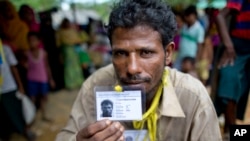Mohammad Saleem was born and raised in Myanmar. But at no time in his 30 years of life did the government ever recognize him as a citizen.
He finally attained some of that long-awaited recognition in exile — with an official identification card issued not by Myanmar, but by the Bangladesh Department of Immigration and Passports.
Saleem, a Rohingya Muslim who lived in northern Myanmar, is one of more than half a million members of the minority ethnic group who have fled across the border to Bangladesh since late August after their homes were set ablaze by security forces and Buddhist mobs. Most people in Myanmar see the Rohingya as foreigners, even though most were born there.
Bangladeshi authorities are now carrying out the immense task of registering the newly arrived refugees and issuing laminated identification cards that list their name, age, and place of birth. The cards identify the refugees as “Myanmar Nationals.”
Posing for a photograph at a refugee camp in Kutapalong, Saleem said he never had an identity card before. After entering Bangladesh as part of the mass influx on Sept. 26, he was finally issued one on Sunday.
The cards are so precious that he said he put those of his wife and daughter around his neck for safekeeping when they went to bathe.
“I was not happy in Myanmar because they are killing people and destroying everything,” Saleem said. “That is why I came here. I am happy to be in Bangladesh.”
The Rohingya have been denied basic rights and freedom of movement in Myanmar for decades. Though members of the long-persecuted minority first arrived generations ago, most were stripped of their citizenship in 1982, rendering them stateless.
